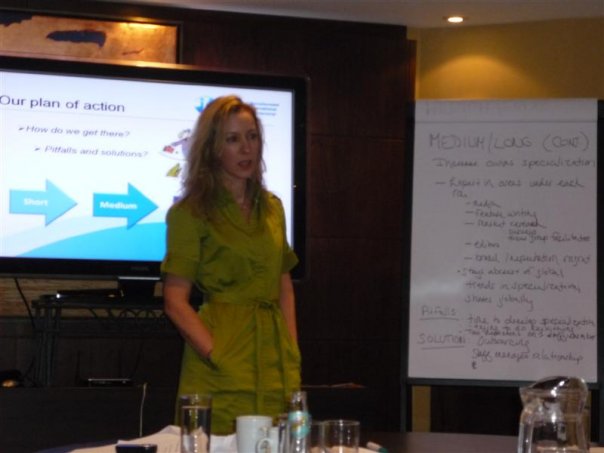Working with the media, to me, has always been the most favorite part of my job. I think it has to do with my beginnings. I studied journalism as an undergraduate at Rutgers University, and before that, my high school history teacher told me, “If you don’t become a journalist, I will hunt you down” (and no that was not Brooklyn but a small town in Massachusetts).
I left Rutgers with stars in my eyes twenty years ago about to set out on my first print journalism job for an international finance journal. My first year, like it is for most journalists, is a tough one where your editor rides you until you get it right. Many days I would spend eight hours rewriting the same paragraph. It gave me the ability to see the story and, most importantly, to understand what it was like to be a reporter.
Fast forward ten years later and I returned to Rutgers to work in broadcast television, creating five-minute magazine lifestyle segments for the tri-state area. The inside knowledge I gained on both print and broadcast journalism has helped me enormously.
I have been through a lot of media training with many different consultants who always say, “Remember, the journalist is not your friend.” That phrase has always concerned me.
There is a working relationship between you and each and every journalist you interact with in your role as spokesperson. They are looking for a story and you are guiding the story with the intent of conveying your messages to the wider public. It is a two-way street.
What is the best recipe for a good working relationship? R-e-s-p-e-c-t. How do you gain respect – by the way you treat each other.
How does that translate in your interactions? When contacted, be respectful, thank them for contacting you, tell them when you will get back to them and follow through on that. If you receive a voicemail, call them back within 30 minutes no matter what. Make sure your voicemail has your cell number dedicated to press calls. Be a source for information or, if you are not one, recommend another individual at another organization. Realize that they have a boss too and that story will not see the light of day unless the editor approves it. Help them out. You want to see that story just as much as the journalist does. Both of your jobs depend on it.
Often times, they will not be as well versed in your subject area. Reporters are often generalists. You will need to take the time to ensure you provide them with a full understanding of the issues without talking down to them. This may include scheduling internal expert interviews, recommending other experts to interview and research and reports.
Be patient. They will ask questions and will ask about your answers. Be slow and methodical with your responses. If you do not know the answer, say so – do not ever make it up. And avoid “no comment” as much as possible.
If you need time to prepare, ask for that time by scheduling the interview. You can then prep potential questions and answers and rehearse them with a member of your team. Always consider what the angle could possibly be and run through those scenarios. Ask the journalist what the angle is and what potential interview questions they may have. Most importantly, make sure your messages are ready and can be conveyed repeatedly in your responses.
Quick Tips:
As a spokesperson, you have a working relationship with each journalist you come in contact with.
Treat each journalist with respect by responding to their queries when you say you will, providing them with information needed to write the story, being seen as a credible and reliable source by recommending other experts.
Be patient. Most reporters are generalists and will need some time to grasp the full story.
Do not hesitate to ask for the angle and possible interview questions to help you prepare for an interview.




